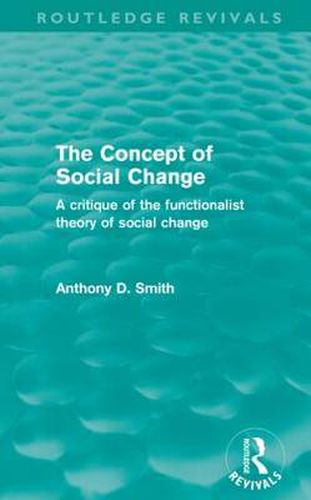Readings Newsletter
Become a Readings Member to make your shopping experience even easier.
Sign in or sign up for free!
You’re not far away from qualifying for FREE standard shipping within Australia
You’ve qualified for FREE standard shipping within Australia
The cart is loading…






Anthony Smith’s important work on the concept of social change, first published in 1973, puts forward the paradigm of historical change as an alternative to the functionalist theory of evolutionary change. He shows that, in attempting to provide a theory of social change, functionalism reveals itself as a species of ‘frozen’ evolutionism. Functionalism, he argues, is unable to cope with the mechanisms of historical transitions or account for novelty and emergence; it confuses classification of variations with explanation of processes; and its endogenous view of change prevents it from coming to grips with the real events and transformations of the historical record. In his assessment of functionalism, Dr Smith traces its explanatory failures in its accounts of the developments of civilisation, modernisation and revolution. He concludes that the study of ‘evolution’ is largely irrelevant to the investigation of social change. He proposes instead an exogenous paradigm of social change, which places the study of contingent historical events at its centre.
$9.00 standard shipping within Australia
FREE standard shipping within Australia for orders over $100.00
Express & International shipping calculated at checkout
Stock availability can be subject to change without notice. We recommend calling the shop or contacting our online team to check availability of low stock items. Please see our Shopping Online page for more details.
Anthony Smith’s important work on the concept of social change, first published in 1973, puts forward the paradigm of historical change as an alternative to the functionalist theory of evolutionary change. He shows that, in attempting to provide a theory of social change, functionalism reveals itself as a species of ‘frozen’ evolutionism. Functionalism, he argues, is unable to cope with the mechanisms of historical transitions or account for novelty and emergence; it confuses classification of variations with explanation of processes; and its endogenous view of change prevents it from coming to grips with the real events and transformations of the historical record. In his assessment of functionalism, Dr Smith traces its explanatory failures in its accounts of the developments of civilisation, modernisation and revolution. He concludes that the study of ‘evolution’ is largely irrelevant to the investigation of social change. He proposes instead an exogenous paradigm of social change, which places the study of contingent historical events at its centre.